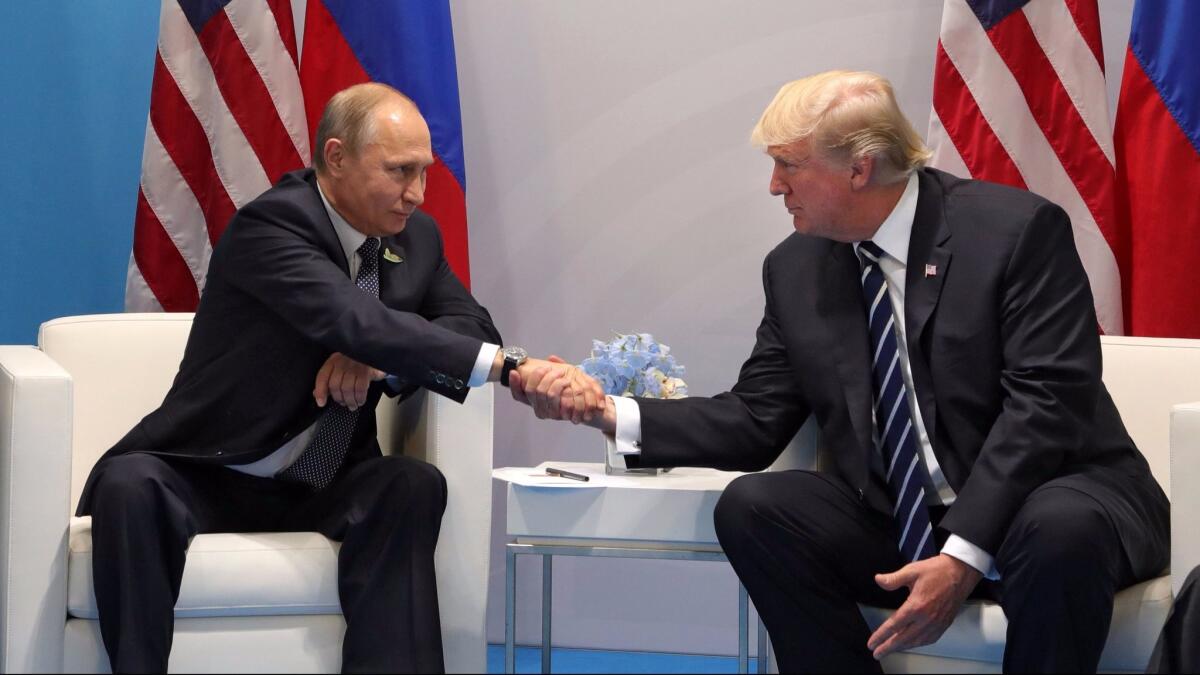Editorial: Trump is still giving Putin the benefit of the doubt — and it’s weakening U.S. policy on Russia

- Share via
Vladimir Putin’s decision to order a reduction in the U.S. diplomatic presence in Russia is an admission of defeat in his efforts to reverse sanctions imposed by the Obama administration for Russia’s meddling in last year’s U.S. elections. “We waited for quite a long time” to respond, Putin said in a television interview Sunday, in the hope “that, perhaps, something will change for the better.”
But it’s easy to see why Putin might have thought President Trump in the end would forgive Russian interference in the race for the White House — which U.S. intelligence agencies described as “a significant escalation in directness, level of activity, and scope of effort compared to previous operations aimed at U.S. elections.”
In December, when Putin didn’t immediately retaliate for President Obama’s expulsion of 35 Russian diplomats and his closing of two compounds allegedly used for espionage, then-President-elect Trump tweeted: “Great move on delay (by V. Putin) — I always knew he was very smart!”
The U.S. must proceed cautiously and with due regard for Russia’s hostile behavior toward the U.S. and its allies.
After Trump took office, his administration floated the idea of easing sanctions. Last month, Trump aide Sebastian Gorka said the administration was considering returning the compounds in Long Island, N.Y., and Queen Anne’s County, Md., to Russia because “we want to give collaboration [and] cooperation a chance.”
And even when Putin lost patience and retaliated, it wasn’t because Trump changed his mind about Russian meddling. According to Anthony Scaramucci, the president’s now-fired communications director, Trump recently said, “Maybe they did it, maybe they didn’t do it.”
What really happened is that veto-proof majorities in both houses of Congress gave Trump little choice but to endorse legislation codifying these sanctions and others punishing Russia for its aggression in Ukraine and arms shipments to Syria. (The bill also imposes sanctions on North Korea and Iran.) Trump rationalized his decision to support the legislation by claiming, unconvincingly, that “critical elements” had been modified to meet his objections.
The problem with Trump’s position isn’t that he wants to maintain communications with Putin. Obviously, the United States must deal with Russia on a variety of issues, including North Korea, the war in Syria and negotiations on the two superpowers’ nuclear arsenals. But the U.S. must proceed cautiously and with due regard for Russia’s hostile behavior toward the U.S. and its allies.
Vice President Mike Pence seems to recognize that. Speaking in Tallinn, Estonia, on Monday, Pence said that “the president and our Congress are unified in our message to Russia — a better relationship, and the lifting of sanctions, will require Russia to reverse the actions that caused the sanctions to be imposed in the first place.”
That message would ring truer, though, if Trump would stop questioning whether Russia really was guilty as charged.
Follow the Opinion section on Twitter @latimesopinion and Facebook
More to Read
A cure for the common opinion
Get thought-provoking perspectives with our weekly newsletter.
You may occasionally receive promotional content from the Los Angeles Times.









